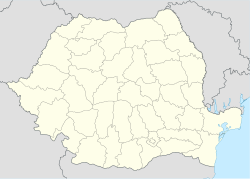Romula or Malva was an ancient city in Roman Dacia, later the village of Reşca, Dobrosloveni Commune, Olt County, Romania. It was the capital of Dacia Malvensis, one of the three subdivisions of the province of Dacia.
| Location | Romania |
|---|---|
| Region | Olt County |
| Coordinates | 44°10′00″N 24°24′00″E / 44.166667°N 24.4°E |
History
edit| Romula (castra) | |
|---|---|
| Known also as | Castra of Reșca |
| Founded during the reign of | Trajan[1] |
| Founded | 2nd century AD |
| Abandoned | c. 6th-7th century |
| Attested by | Tabula Peutingeriana |
| Place in the Roman world | |
| Province | Dacia |
| Capital of | Dacia Malvensis |
| Administrative unit | Dacia Malvensis |
| Administrative unit | Dacia Inferior |
| Directly connected to | |
| Structure | |
| — Stone structure — | |
| Size and area | 216 m × 183 m (3,9[1] ha) |
| — Wood and earth structure — | |
| Built during the reign of | Trajan[1] |
| Size and area | 100 m × 100 m (1[1] ha) |
| Stationed military units | |
| — Legions — | |
| — Cohorts — | |
| I Flavia Commagenorum[2] | |
| Location | |
| Coordinates | �44°10′N 24°24′E / 44.167°N 24.400°E |
| Town | Reşca |
| County | Olt |
| Country | Romania |
| Site notes | |
| Condition | Ruined |
| Excavation dates | 1900[3] |
| Archaeologists | Pamfil Polonic[3] |
The Roman city of Romula lay on an earlier Dacian city called Malva. It received the title of municipium during the rule of Hadrian (117–138) and the title of colonia during that of Septimius Severus (193–211).
The city had two belts of fortifications and two castra, part of the Limes Alutanus frontier system and where soldiers of the Legiones VII Claudia and XXII Primigenia were temporarily stationed, alongside a permanent unit (numerus) of Syrian archers.
See also
editReferences
edit- ^ a b c d Academia Română: Istoria Românilor, Vol. 2, Daco-romani, romanici, alogeni, 2nd. Ed., București 2010, ISBN 978-973-45-0610-1
- ^ Tactica, strategie si specific de lupta la cohortele equitate din Dacia Romana, Petru Ureche[permanent dead link]
- ^ a b "Manuscrisele lui Pamfil Polonic". cimec.ro. Retrieved 15 December 2012.
Ancient
edit- Anonymous. Tabula Peutingeriana (in Latin).
- Ptolemy, Claudius (c. 140). Geographia [Geography] (in Ancient Greek). Sumptibus et typis Caroli Tauchnitii.
Modern
edit- Olteanu, Sorin. "Linguae Thraco-Daco-Moesorum – Toponyms Section". Linguae Thraco-Daco-Moesorum (in Romanian and English). Archived from the original on 16 July 2011. Retrieved 3 January 2010.
- Dicţionar de istorie veche a României ("Dictionary of ancient Romanian history") (1976) Editura Ştiinţifică şi Enciclopedică, pp. 510
- Buqinca, Arianit (2021). Recherche sur les Dardaniens : VIe- Ier siècles av. J.- C. (Thesis). Université de Lyon.
Further reading
edit- Olteanu, Sorin. "Linguae Thraco-Daco-Moesorum – Toponyms Section". Linguae Thraco-Daco-Moesorum (in Romanian and English). Archived from the original on 16 July 2011. Retrieved 3 January 2010.
- Tătulea, Corneliu Mărgărit. Romula-Malva. Monografie. București, Ed. Museion, 1994, 176 p.
External links
edit- Roman castra from Romania – Google Maps / Earth Archived 5 December 2012 at archive.today
